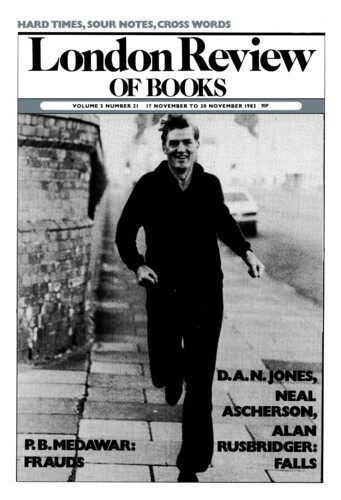(for Peter Porter)
I
The maroon-hued slugs swallow the garden down.
Out at sea the ships on fire with light
Like burning soldiers drawn up on parade.
I switch on the electric light;
It is a furnace in a vase.
Then the maroon that slaps the night:
The lifeboat is out,
One of those lighted ships is toiling
With some current like a great maroon dragon;
Let its stacked lights not be quenched.
I fear some outlying storm is killing men.
In the morning a wheatfield
Like a festival of plumes,
Stuffed with wind like lurkers and shifters.
II
Our new offices have just been opened in the old Baths,
A clean airy series of halls
In which the paperwork partakes of the cleanness,
And office work is no longer onerous,
Especially on still days
When we can slant the long verandah windows open.
The river sliding past the orchard tastes of apples,
Clean-tasting apple-water.
III
She polished up her hair with the palms of her hands,
Our Chief, and settled back, sighing;
The named constellations overhead, floating,
And the names of the ships bearing their own lights
Through the water of white documents in the dry Baths,
Their own patterns, bearing their own names,
Their own frequencies, White Sun,
Rainsource; and the great ships
Which are stars
Drenching us with their light,
The rilling wake, signalling,
The enormous radio operators tapping out,
IV
One of their messages being this cinnamon
I taste in our lunchtime baked apples,
One of the constellations of the odours of Venus,
The multitudinous odours
In the cold baked apples in the sandwich box.
V
Our Chief slid her scalpel on to the next task;
Uncanny pleasure moved within her.
In her grip she took the lading papers
Of the great barquentine Mozart
Just as that magic equipage moved so slowly
Past the broad windows of our offices
Our new offices in the old Baths.
Uncanny pleasure moved within her like a full-rigged ship
As if she entered her naked self
Into a silky sea of ships;
Great full-masters sailed across her breasts.
Her smile in the office meant the tide was full,
The draught sufficient,
As the great barque in its weathered colours
Glides past the window, pennant flying,
In its weathered colours.
VI
‘When they brought the General home,’
She remarked, glancing at the Mozart’s manifest,
‘The coffin that had been furnished
Was too small. “May we,” asked the men
Charged with the task of burial,
“May we break the General’s bones?”
And were almost lynched for this inquiry.
Eventually,’ she said, ‘he travelled on an open bier,
Two sailors on the deck constantly on guard
To keep the seabirds from his eyes. When
They docked, the salt spray had tarnished almost black
The braid of his dress uniform, and
His dead face was handsomely tanned.’
VII
Dark sails against the light showed the approach
Of a big ship. It was indeed,
As his papers said, the great barquentine
Mozart, with its sails composed
Like a palladian mansion of closing light and opening shadow.
Would there be
In some inner berth or cabin
Of the great floating house
Of harmonising and motive breezes,
Laid on a fleece in this ship
Scrubbed immaculate to its planks,
A new-born child
Stripped of its primordial clothing,
Which is to say his Mother,
Who has walked away singing
To drink cordials in another cabin,
Knowing the god to be safe now,
Ready to be brought in through the Customs
Into the little seaside town
As the epagomenal days draw in?
There is a great flash from the sea as the sun goes down;
What will that gliding sun bring
With a hull heavy like a drop of honey, shouldering
Its way through those hexagonal reefs of stars?
VIII
On the lawn outside the Baths
A young horse has got free of its paddock,
Is cantering around, being chased
By a young girl with a bridle,
Our Chief’s single-parent family’s daughter.
The pony tosses its wet mane
In the sunlight and creates
A rainbow round itself and the child
And allows itself to be caught and led at her hand
As at anchor, as if tending to an anchor.
Send Letters To:
The Editor
London Review of Books,
28 Little Russell Street
London, WC1A 2HN
letters@lrb.co.uk
Please include name, address, and a telephone number.

